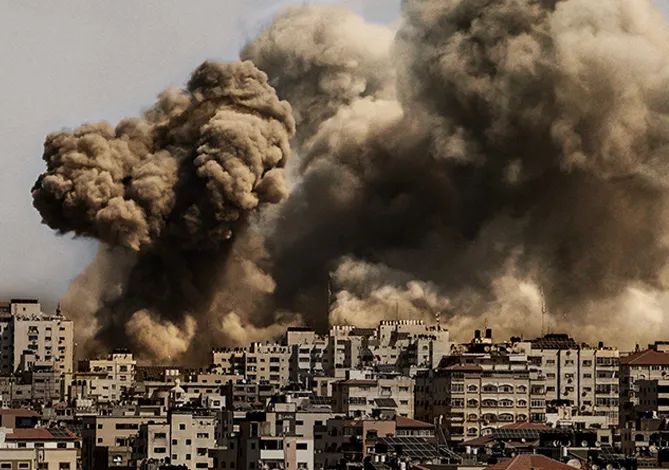
Officially coming into existence in 1971, Qatar is a small nation within the Gulf region that has garnered much attention due to its larger-than-life presence in regional conflicts and issues within the Middle East (West Asia). Qatar’s foreign policy stems from self-preservation and protection of the current royal families (like most other Gulf nations). Post its independence, it jumped on a Saudi Arabia bandwagon, on which it relied for protection but soon changed course by the early 1990s. Two factors drove this change: the first was the Iraqi invasion of Kuwait (1990) which was not prevented by Saudi Arabia, signalling to Qatar that it could not rely on Saudi for its security; and the second was the change in guard with Sheikh Hamad bin Khalifa coming to power in 1995.
Qatar’s foreign policy stems from self-preservation and protection of the current royal families (like most other Gulf nations).
To assert Qatar’s independence, Hamad began to pursue an activist foreign policy whereby it began to balance interests between Iran and Saudi, its two major neighbours which were generally at odds with each other. As part of this foreign policy change, Qatar began to expand its influence by investing in soft power. Setting up Al Jazeera in 1996 was a part of this move. In the same vein, it also became among the first Gulf nations to officially establish relations with Israel in 1996. Shortly after, it also opened its doors for the United States (US) military via the Al Udeid Airbase from where the US launched attacks on al-Qaeda targets in Afghanistan post the 9/11 attacks.
Mediating between Israel and Hamas
In addition to the balancing act in its foreign policy, Qatar also acted as a mediator in various conflicts in the Middle East, for example, stepping in between Hamas and Fatah (a rival political party in Palestine) since 2006 and other such conflicts in Yemen, Lebanon, South Sudan, and Libya throughout the last two decades. Qatar’s role as a mediator in conflicts has helped it gain a strong presence in the region as did its support for revolutionary movements across the Arab states during the Arab Spring of 2011. It is within this context that its current role as a mediator between Israel and Hamas can be understood.
Qatar’s relations with Hamas have been growing since 2006, when Hamas ousted the then-existing Palestinian Authority from the Gaza Strip. Since then, Qatar has been hosting Hamas officials at various summits and meetings. Since 2016, the current leader of Hamas, Ismail Haniyeh has also been stationed in the country. Apart from some ideological proximity to Hamas, Qatar also views the group as the only channel by which the lives of the Palestinians in the Gaza Strip can be improved. This belief has led to Qatar sending over US$ 1 billion to the region over the last couple of decades.
Qatar’s role as a mediator in conflicts has helped it gain a strong presence in the region as did its support for revolutionary movements across the Arab states during the Arab Spring of 2011.
In contrast, Qatar has also engaged with Israel since 1996 and maintained a nominal relationship with the nation till 2009 when it severed ties with Israel over the latter’s offensive in Gaza. A part of its engagement with Israel also arises from its relationship with the US with which it has cultivated strong trade and military ties over time and even helped mediate the US’ rivalries with Iran and Afghanistan (specifically the Taliban). Thus, it is these ties with the US and Qatar’s own desire to balance relations that have led it to maintain back-channel contacts with Israeli officials despite officially severing ties.
Current mediations and the outlook
As most observers have pointed out, the now ended ceasefire between Hamas and Israel would not have been possible without Qatar’s aggressive efforts to bring down tensions. Hosting both Israeli and Hamas leaders in negotiations, it managed to achieve a ceasefire that was extended at least twice. Overall, Qatar’s role in the conflict between Israel and Palestine is aimed at ensuring that some semblance of peace and reconstruction takes place after the war settles.
However, through these mediation efforts, Qatar also intends to carve out a larger stage for itself as a middle power and political power broker in the Middle East, a region rife with conflicts. Qatar thus intends to cement itself as an indispensable nation for the West, should there ever be any more issues threatening its security such as the blockade launched by other Arab nations against it between 2017 and 2021.
Through these moves, Qatar’s foreign policy which has changed course over time, from one ensconced in the safety of Saudi Arabia’s presence to a more independent policy focused on increasing its influence, has given it a strong presence in the current conflict. However, with the triumphs also come a fair bit of challenges.
Qatar’s role in the conflict between Israel and Palestine is aimed at ensuring that some semblance of peace and reconstruction takes place after the war settles.
Most of the Arab and Muslim world are looking at Qatar positively for taking a stronger policy in favour of Palestinians over time. However, its ties with Israel and the US are also being slightly tested. The US policymakers are demanding that Qatar eject all Hamas officials given its attacks on Israel. Moreover, Israel has also vowed to destroy Hamas completely—a threat that has been followed up by relentless bombings including on civilian areas.
Both options are not favourable to Qatar which will lose one of its biggest contacts if Hamas were to be removed (from Qatar or from existence). However, further support for Hamas, especially if more attacks are carried out, could also weigh down Qatar and adversely affect its relations with the US. Caught between a rock and a hard place, what Qatar hopes now is that its strong supply of gas and energy to the US, its support for US military troop, its ability to mediate in other conflicts as well as its strong diplomatic skills will allow it to hold sway with the US once the dust settles.
Mohammed Sinan Siyech is a Non Resident Associate Fellow at the Observer Research Foundation
The views expressed above belong to the author(s). ORF research and analyses now available on Telegram! Click here to access our curated content — blogs, longforms and interviews.




 PREV
PREV


